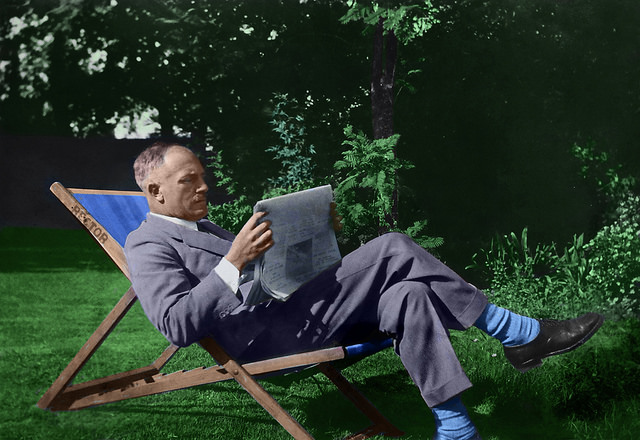
Warning: naughty language ahead!
Today we’re talking about male privilege, where it concerns dating and relationships.
Male privilege is a term for social, economic, and political advantages or rights that are made available to men solely on the basis of their sex. A man’s access to these benefits may also depend on other characteristics such as race, sexual orientation and social class. ~ Wikipedia
It’s not something that I have really thought about, in fact, the term is relatively new to me. The Urban Dater’s own Managing Editor, Betty Mars, shared some writing with me that got me thinking. But the subject is timely in my current relationships and applies to a pair of past relationships that I can recall.
In my current relationship, I’m having a hard time coping with, what I feel, is a place of limbo. I’m not going to get into the whole story here, but the short of it is that I I’m looking for a commitment from my lover and she’s not ready to give that to me. I’m the one chasing, I’m the one trying to get the commitment—and that’s quite a bit different than what I’m used to. I’ve been used to the woman trying get the commitment from me.
My partner is working on writing her dissertation and working toward her P.h.D. She does not want children. Therefore, her sense of urgency has nothing to do with our relationship or her biological clock, if you will. She’s prioritizing her goals ahead of my wants and desires. There’s nothing wrong with that, but it makes me feel anxious because I’m not “numero uno” in her life. I know that what she is doing is necessary and I know that she’s got to get it done. I support that. I get it.
It’s not easy being with someone when you are not their top priority, but if I think about why, it makes coping easier. She’s trying to accomplish a goal. She will feel better about herself and it will positively impact her future. How could I not support that? In the meantime, I may grumble about it, but I’m going to be supportive.
This is what has me thinking more about male privilege in dating and relationships.
I’m not an expert, but I play one on the internet.
I’m not an expert on what women have had to deal with and what they continue to deal with daily: from the government telling them what they can and can’t do with their bodies to how women are always objectified in media, and also how women have to go about their day often being concerned with their personal safety. These are the “easy ones” to point out. There’s a lot more here to mention and ones I don’t know about.
These are struggles that, frankly, I don’t have to think about as a male, as I’ve always gone about my experiences as being “par for the course.” I am not the default, however, thinking we are the “default” is a choice. I’m making a conscious choice to not go about my life thinking that “this is just the way things are.” I’m questioning what has “always been” and asking why. We still have a long way to go before we can pat ourselves on the back regarding women’s rights and equality.
What I’m really getting at here is the notion of male privilege where it concerns relationships between men and women. This privilege takes on many forms and, yes, male brethren, it does exist and we need to raise our awareness because women are our equals and partners, and not inferiors or subordinates. We need to make a choice to really think about how we think about women and their role in relationships.
Examples of Male Privilege
Have you heard about the “nice guy” who never “gets” the girl? It’s probably the most innocent sounding bit of male privilege in dating.
There’s a notion that women should date the nice guy because simply because he’s “nice.” I’ve heard tales of nice guys getting angry when they get rejected by the good girls. This is a topic I touched on recently. It doesn’t matter if you’re the sweetest guy on the block or the biggest asshole since Goetse, no one owes you, or anyone, anything. Period.
Another example is the myth of the “friend-zone.” Again, there’s a notion that if men are nice to women that they have an obligation to us. Of course, this is utter bullshit. No one owes us a thing.
The furor that rejection causes in men is appalling and downright inexcusable. Don’t believe me? Look up #byefelipe on Instagram for reference. What women deal with boggles my mind, not only in the world of online dating, but simply just going through life on a day to day basis.
I don’t have to deal with women calling me names, shaming me, or getting irate when I don’t respond to their messages in an online dating app. So many men think it’s funny to joke about raping and acting violently against women as if that woman isn’t a human being. This is scary shit and, aside from being unacceptable behavior, is sociopathic.
In recent television, Aziz Ansari tackles male privilege in an episode of Master of None, “Ladies and Gentlemen,” where there is a compare/contrast scene between a woman going home from a bar and fearing for her safety because she was being followed by a man—a “nice” guy she earlier rejected. She stayed on well-lit streets and avoided shortcuts, all in an attempt to get to her place safely but quickly. Aziz and his lumbering pal stumble home, taking care-free shortcuts through a park. What do two men have to fear going home compared to women? It was a simple, yet effective scene and one that caused a few light bulbs to go off. For women, dating or simply going out on the town is a risky venture.
Where else have I observed male privilege? I need only look to my past relationships for reference material. Specifically two women who wanted to have children.
They were the ones pushing to have “the talk” and to move things forward. I just kinda went on and did what I wanted, with little regard. Why? It wasn’t because I didn’t care but there was no sense of urgency on my part. I didn’t really want kids. If I did, it wouldn’t be a problem because I can still produce babies. My sperm may get older, but it can still produce.
What about my exes? They had a sense of urgency—they have a finite time where they can have children. This is magnified when a woman hits her mid-thirties.
Not having to worry about that is another form of male privilege. Another example, for instance: men are more likely to commit a murder (at a 90% clip). This is something women carry a heightened awareness of, especially considering that there is an increased likelihood of a woman to be a victim of domestic violence or homicide. I’ve had a couple female friends confide that they were worried about their partner’s temper. One of them actually had her partner pull a gun on her and then fire it into the air. She was scared for her life. Scary shit!
Who wears the pants anyway?
Who “wears the pants” in your relationship? What does that even mean?
It’s the idea that one person in a relationship is in charge; it is they who sets the agenda and makes the sun rise and set. That’s always been my understanding. Men, of course, are the ones who wear the pants and should be the ones in charge. Right? Well, women have been wearing pants for quite some time, so the term and the idea shouldn’t be exclusive to men.
I’m not a renaissance man or anything like that. But I want a strong partner, someone who can make decisions and be empowered to get shit done when I’m not around, or even kick my ass if it’s needed.
If your wife or your girlfriend is always putting things into the calendar, ask yourself “why?” If your SO is doing the laundry or picking up the groceries, ask yourself “why?” Is it truly because “they’re just good at it” or is there some other reason for these behavioral defaults?
How do we call out male privilege in dating and relationships?
I’ll just say it right now: I’m not qualified to answer this question. Also, I’m not even sure if this is the right question to ask! I don’t even know if I’m doing more harm than good by adding my voice to the conversation.
I believe that being more critical in thought, of how we, as men, go about our relationships with one another is a good start. Ideally, we should be confronting these issues of inequality aloud, advocating for the marginalized, and asking “why” we do (or don’t do) things in relationships. Is it because that thing is something the woman is supposed to do? Is it just because of how we were raised? Realizing that there are parts of our lives that we don’t think about because that’s just the way it’s always been is a key step. It’s about making a choice to really think about how we think about our relationships.
I’ve always grown up believing women were the homemakers, child rearers, peacekeepers, appointment setters…I know this way of thinking is antiquated. I love a strong woman. I guess I should define what that means to me. A strong woman speaks her mind, pursues her interests and goals, and she is bold and brave; she doesn’t need a man to validate her; she doesn’t need validation from marriage or from having children. Her validation is her own. She defines it.
Perhaps the other part of calling out male privilege is simply understanding that women don’t really need us.
My partner is brilliant. Sure, I’m partial, but she really is, as she effortlessly tosses out words I don’t know the meaning of. She’s funny, engaging, well-read, and has attended some of the best schools. I brag about her. A lot! She doesn’t need me. I’m a college never-was. I learn shit the hard way, I say “fuck” and “shit” way too much, and have the maturity level of 12-year-old. I think that’s where being secure with yourself comes into play. Relationships aren’t a “pissing contest.” We can just be who we are. There’s something about me that she appreciates—many things, actually. I know that.
The world is slowly changing to catch up to the notion that women are equal but it will take time. As men, it is important to understand that women are our partners; beyond that, we need to listen to the conversations and understand them.
I’m not going to tell you how to run your own relationships—my previous relationships have been a disaster. Instead I suggest this to you: ask “why” in your relationship. Ask why your role is what it is and why your partner’s role is what it is. Ask your partner what they think and then sit back and just listen. You might be surprised at what you learn.
Fellas, it’s time we started questioning things that have always been and just listen.
Relephant Read:
The Heterosexual Quiz: 25 Questions to Ask Straight Folks.~
Author: Alex Vasquez
Editor: Catherine Monkman
Photo: Caroline/Flickr








Read 0 comments and reply